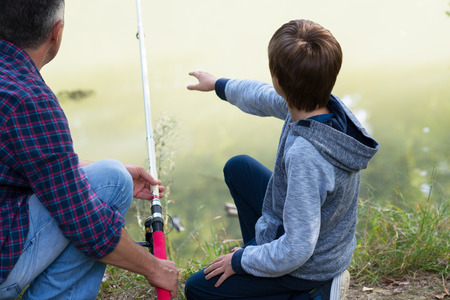Introduction to Junior Angler Programmes in the UK
Across the UK, junior angler programmes have emerged as a cherished part of community life, weaving together local tradition, environmental awareness, and the timeless allure of British waterways. These initiatives, often run by angling clubs, charities, and environmental organisations, are more than just an introduction to fishing for young people—they serve as vital gateways to the natural world and custodianship of cherished landscapes. In towns and villages from the rolling Cotswolds to the rugged Scottish Borders, these programmes are deeply embedded in British culture, reflecting a national affection for rivers, lakes, and the quiet art of angling. By welcoming children onto the banks of local waters, junior angler schemes do more than teach casting techniques; they foster a sense of responsibility and belonging rooted in nature. As young participants learn to appreciate the rhythms of the river or canal, they’re also introduced to the broader heritage of British waterside life—a tradition that values respect for both wildlife and fellow anglers, and which recognises the role of fishing in nurturing mindfulness and community spirit.
Fostering Environmental Awareness Through Hands-on Learning
Junior angler programmes across the UK are at the forefront of nurturing environmental consciousness among young people, using immersive and practical activities to bridge the gap between classroom theory and real-world application. These initiatives go far beyond teaching fishing techniques; they are thoughtfully designed to instil a deep-rooted sense of responsibility for rivers, lakes, and the wider British countryside. By engaging children in hands-on experiences such as river walks, litter picking, and habitat identification, these schemes turn local waterways into outdoor classrooms where stewardship is learnt by doing.
Practical Activities that Inspire Stewardship
The hallmark of these programmes is their commitment to learning by participation. Young anglers are regularly involved in:
| Activity | Purpose | Key Skills Developed |
|---|---|---|
| River Walks | Introduce children to the flora and fauna of British waterways, highlighting ecological interdependence. | Observation, species identification, ecosystem understanding |
| Litter Picking | Foster a sense of ownership and pride in local environments while addressing real environmental challenges. | Teamwork, environmental ethics, practical conservation |
| Habitat Identification | Teach how different habitats support varied aquatic and terrestrial life, underscoring biodiversity’s importance. | Biodiversity awareness, critical thinking, stewardship values |
Local Context: Embracing British Landscapes
By rooting these activities in distinctly British settings—whether it’s a chalk stream in Hampshire or a city canal in Manchester—junior angler programmes make environmental care relatable and immediate. Youth participants come to recognise the unique character of their own region’s waterside habitats and understand their role in preserving these cherished spaces for future generations.
A Lasting Impact on Young Minds
This hands-on approach ensures that lessons about sustainability and ecology are not just absorbed but truly lived. As youngsters spot kingfishers darting over water or remove plastic from reeds, they forge a tangible connection with nature. Over time, this cultivates not only lifelong respect for the outdoors but also an ethos of active guardianship that ripples through families and communities across the UK.

3. Engaging Youngsters with the British Countryside
One of the most captivating aspects of junior angler programmes in the UK is how they immerse young people in the heart of the British countryside. Through hands-on experiences along riverbanks, tranquil lakes, and winding canals, these initiatives introduce children to landscapes steeped in heritage and teeming with natural wonder. Angling becomes more than just a pursuit of fish; it is a gateway to discovering the unique beauty and diversity found across Britains waterways.
By encouraging time spent outdoors, junior angler schemes foster a deep-rooted connection between youngsters and their local environment. The gentle art of fishing requires patience and quiet observation, naturally drawing attention to the subtle rhythms of nature — from kingfishers darting along the water’s edge to dragonflies hovering above reeds, or otters slipping silently through dawn mist. Such encounters inspire awe and respect for wildlife, nurturing an early appreciation for conservation.
Moreover, these programmes often weave lessons on responsible behaviour into every session, highlighting the importance of leaving no trace, protecting habitats, and understanding seasonal changes within aquatic ecosystems. Whether casting a line beneath ancient willow trees or learning to identify native fish species, young anglers absorb valuable lessons about stewardship and sustainability that extend far beyond the waterside.
The distinctive character of British landscapes — whether it’s the rolling hills of Yorkshire intersected by meandering rivers or the reed-fringed broads of Norfolk — becomes an integral part of each child’s experience. This direct engagement fosters not only personal wellbeing but also a sense of pride and guardianship over local natural treasures, ensuring future generations value and protect Britain’s rich aquatic heritage.
4. Partnerships with Local Communities and Conservation Groups
One of the defining strengths of junior angler programmes in the UK lies in their commitment to collaboration. These initiatives rarely operate in isolation; instead, they actively forge partnerships with local angling clubs, conservation charities, and community action groups. Such alliances are crucial for championing both waterway conservation and a broader sense of community stewardship, instilling in young anglers a deep-rooted respect for the natural world and the communities that rely on healthy aquatic environments.
The Power of Collaborative Action
Through joint ventures, junior angling schemes gain access to a wealth of resources and expertise. Angling clubs often provide hands-on guidance and local knowledge, while environmental organisations contribute scientific understanding and practical experience in habitat restoration. This synergy leads to a wide range of activities that blend education with real-world impact, from riverside litter picks to monitoring fish populations and planting native vegetation along banks.
Examples of Successful Partnerships
| Partner | Role | Key Activities |
|---|---|---|
| Local Angling Clubs | Mentorship & Skills Training | Taster sessions, fishing tutorials, safety workshops |
| Conservation Charities (e.g., The Rivers Trust) | Environmental Education & Project Support | Habitat surveys, invasive species removal, awareness campaigns |
| Community Action Groups | Stewardship & Outreach | Organising clean-up days, community events, youth ambassador schemes |
Nurturing Stewardship Through Community Engagement
By participating in collaborative projects, junior anglers develop a tangible connection to their local waterways and surrounding landscapes. These experiences foster a culture of care—one where young people see themselves not just as visitors to the water’s edge but as vital stewards. In turn, this shared responsibility ripples outwards, inspiring families and wider communities to join conservation efforts. Ultimately, it’s through these partnerships that junior angler programmes truly embed environmental stewardship into the heart of British angling culture.
5. Building a Culture of Responsible Angling
At the heart of every junior angler programme in the UK lies an unwavering commitment to fostering a culture of responsibility and care for our waterside environments. These programmes go beyond the mere mechanics of casting a line—they embed robust codes of conduct that shape young anglers into thoughtful custodians of Britain’s cherished waterways. Young participants are introduced to the importance of respectful behaviour, both towards fellow anglers and the natural habitats they frequent. Through group discussions, practical demonstrations, and real-life scenarios, juniors learn about minimising disturbance to wildlife, managing litter, and ensuring their presence leaves no lasting trace on the landscape.
A key pillar of responsible angling championed within these initiatives is the practice of catch-and-release. Juniors are taught not only how to land fish safely but also how to handle them with wet hands or soft nets, supporting swift release with minimal stress or harm. This approach is reinforced by a deep respect for local biodiversity—a concept woven throughout each session. Programme leaders highlight the vital roles played by native fish species, aquatic plants, and even invertebrates in maintaining healthy water ecosystems. By understanding these interconnected relationships, youngsters gain perspective on why selective fishing and respecting closed seasons are crucial for sustaining wild stocks.
Furthermore, these codes of conduct often extend to encouraging anglers to report signs of pollution or invasive species, empowering them as active stewards rather than passive visitors. As such, junior angler programmes are instrumental in cultivating traditions that value sustainable harvests, ethical behaviour, and long-term environmental balance. The result is a new generation primed to uphold Britain’s rich angling heritage—one that blends skill with sensitivity and ensures our rivers, lakes, and canals thrive well into the future.
6. Long-Term Benefits for Participants and the Environment
It is widely recognised that engaging young people early in stewardship through junior angler programmes yields lasting rewards, both for individuals and for Britain’s precious aquatic environments. By introducing children to responsible angling practices and fostering a genuine respect for local waterways, these initiatives plant the seeds of environmental consciousness that often flourish throughout adulthood.
For participants, involvement in such schemes does more than teach fishing skills. It builds a lifelong appreciation for the natural world, sharpens observational abilities, and instils a sense of personal responsibility towards the countryside. Young anglers often grow up to become advocates for conservation, understanding first-hand the delicate balance that sustains our rivers, lakes, and canals. Their hands-on experiences—litter picking on the towpath, monitoring water quality, or participating in habitat restoration—nurture values that go far beyond the bankside.
From an environmental perspective, these programmes act as a safeguard for the future of Britain’s aquatic habitats. With each new generation educated about sustainable practices and the importance of biodiversity, there is a growing community ready to champion cleaner waterways and healthier fish populations. As stewards of their local watersides, former junior anglers are well-placed to spot issues like pollution or invasive species early on and take action—either directly or by working with organisations such as the Angling Trust or local wildlife groups.
Moreover, cultivating this sense of guardianship helps bridge the urban-rural divide so characteristic of modern British life. Whether you’re casting a line in the Lake District or along an East London canal, junior angler programmes foster a connection to place that unites communities around shared environmental goals.
In sum, early engagement in stewardship via junior angler schemes does more than create conscientious citizens; it lays down enduring roots for environmental protection across the UK. By nurturing awareness and equipping young people with both knowledge and purpose, these programmes ensure that Britain’s beloved waterscapes remain vibrant havens—for wildlife and people alike—for generations to come.


